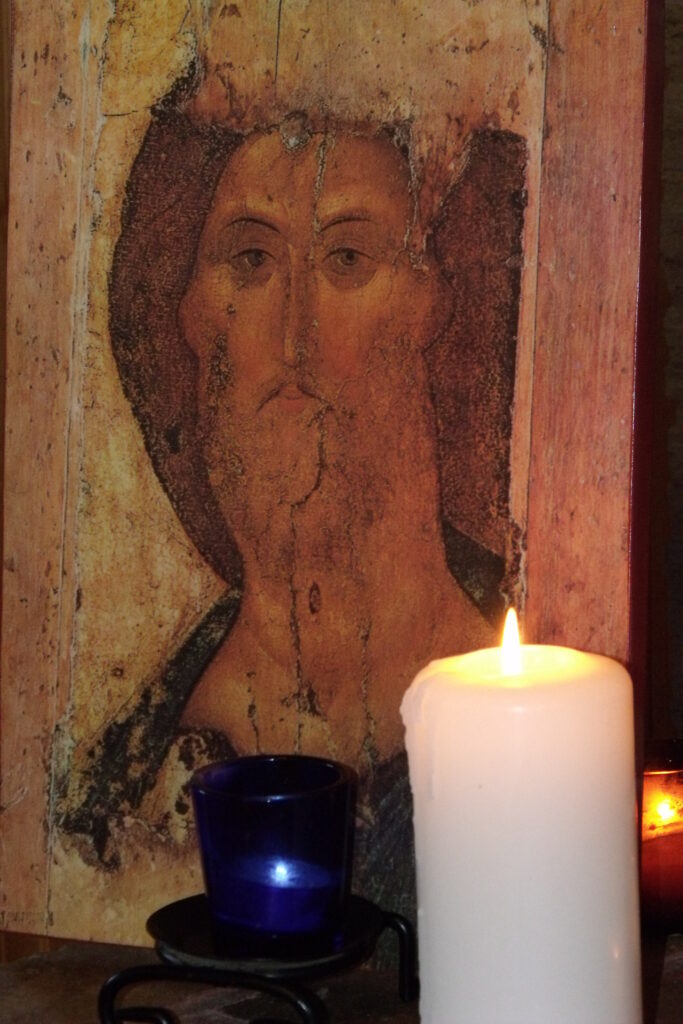Prayer of the Heart
By Robert Fontana
The Greek Orthodox teach that the “heart of God” is anchored in the human heart because the human person is made in God’s image and likeness. The most ancient dwelling place for God in history is not the Ark of the Covenant (with the 10 commandments), not the temple in Jerusalem and not even in the Catholic tabernacle where the Eucharist is reserved. God dwells most intimately in God’s creation, especially in every woman and man because we are made in God’s image and likeness:
Then God said: Let us make human beings in our image, after our likeness. God created mankind in his image; in the image of God he created them; male and female he created them. Genesis 1:26-27

St. Paul agrees:
Do you not know that your bodies are temples of the Holy Spirit, who is in you, whom you have received from God? 1 Cor 6:19
Catholic teaching affirms this.
The desire for God is written in the human heart, because man [and woman are] created by God and for God, and God never ceases to draw [them] to himself. Catechism of the Catholic Church, Art. 27
Deep within his conscience man discovers a law which he has not laid upon himself but which he must obey. Its voice, ever calling him to love and to do what is good and to avoid evil, sounds in his heart at the right moment…. For man has in his heart a law inscribed by God…. His conscience is man’s most secret core and his sanctuary. There he is alone with God whose voice echoes in his depths. Catechism of the Catholic Church Art. 1776
The pathway to the heart of God is the human heart. Each is connected to the other. Every human being regardless of race, creed, color, sexual orientation, or political persuasion has a direct relationship with God “whose voice echoes in his/her depths.” And the fundamental truth that God speaks to every human being from the moment of conception until old age and death is, “My beloved child, I love you. Abide in me as I abide in you.” (John 15:4 adapted)

Of course, we humans have not abided in God. We all know the story of sin in the world and sin in our own hearts. We have been raised in our own family and in a Church community which have struggled to help us know our deepest identity in God. But childhood wounds, personal traumas, poor choices, addictions, and corruption in the Church and society have caused us to forget our deepest identity. We see this echoed so beautifully in the story of Zacchaeus the Jewish tax collector. (See Luke 19:1-10)
Zacchaeus is a Jewish man who, through his collaboration with the Romans as their tax collector, has forgotten his roots. He is a crook who has robbed his own people for material gain and has worked his way up to the top of his profession as the chief tax collector. Yet he is unhappy. He wants to see Jesus and so climbs a tree and gets into a place where he can see Jesus clearly. And when he does, Jesus calls out to him and says, “Zacchaeus, come down immediately. I must stay at your house today.”
Zacchaeus comes down with joy. He is already a changed person. The crowds, meanwhile, get angry at Jesus for staying at the house of a sinner. Jesus has never called Zacchaeus a sinner. He has never said to him, “Repent from your crimes, and get on your knees, and beg forgiveness from God and the people you have robbed.” All we know is that Jesus took the initiative to be with Zacchaeus and dine with him. Zacchaeus, for his part, shows that he has changed:
I give half of my possessions to the poor, and if I have cheated anybody out of anything, I will pay back four times the amount.
Wow! Jesus is impressed. He realizes that Zacchaeus now remembers who he is, where his deepest identity lies. It is not in being a tax collector, a rich and powerful man of the world. What does Jesus say?
Today salvation has come to this house, because this man, too, is a son of Abraham.
Jesus is the incarnation of God’s love. Whatever is in the heart of God is enfleshed in the person of Jesus. To encounter Jesus is to begin the process of rediscovering the deepest truth about oneself by hearing the voice of God say:
“My beloved child, I love you. Abide in me as I abide in you.”
What is the path of prayer to “abide with God?” It is the prayer of the heart, prayer that lets go of words, mental examinations, even imaginative play, and is simply being with God in silence and quiet. This is very Biblical:

Be still and know that I am God. Psalm 46:10
When you pray, go to your inner room, close the door, and pray to your Father in secret. And your Father who sees in secret will repay you. In praying, do not babble like the pagans, who think that they will be heard because of their many words. Do not be like them. Your Father knows what you need before you ask him. Matthew 6:6-8
Slowly over time, by quieting the active mind, the anxious body, the restless soul, we humans learn to rest in God, to receive God’s love, and to let go of unnecessary attachments, fears, resentments, regrets, shames, and control, and finally find a measure of freedom to oneself in Christ. Joy wells up! Love wells up! Peace wells up! Not always, but most of the time.
Prayer of the heart, is a way of praying for every person, especially those like Zacchaeus who get up every day and go to work, even as a tax collector, to be a power for good, confident in one’s true identity as God’s beloved son or daughter.